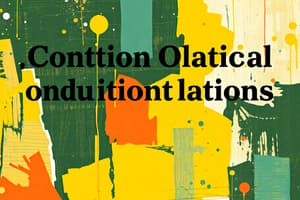Podcast
Questions and Answers
What characterizes a conditional obligation?
What characterizes a conditional obligation?
- It is based solely on the will of one party.
- It is always immediately demandable.
- It can only be extinguished through mutual consent.
- Its demandability depends on the occurrence of a condition. (correct)
In which type of conditional obligation does the condition result in the extinction of the obligation?
In which type of conditional obligation does the condition result in the extinction of the obligation?
- Suspensive obligation
- Mixed obligation
- Potestative obligation
- Resolutory obligation (correct)
Which type of condition is dependent on a third person's will?
Which type of condition is dependent on a third person's will?
- Indivisible condition
- Suspensive condition
- Potestative condition
- Casual condition (correct)
What is a defining feature of an impossible condition?
What is a defining feature of an impossible condition?
Which of the following best describes a divisible obligation?
Which of the following best describes a divisible obligation?
What occurs if an obligation subject to a suspensive condition is lost without the debtor's fault?
What occurs if an obligation subject to a suspensive condition is lost without the debtor's fault?
Which type of positive condition has an event that is necessary to happen at a determinate time?
Which type of positive condition has an event that is necessary to happen at a determinate time?
What option represents a suspended obligation that takes effect but may terminate upon arriving at a day certain?
What option represents a suspended obligation that takes effect but may terminate upon arriving at a day certain?
Flashcards are hidden until you start studying
Study Notes
Types of Obligations
- Pure Obligation: Demandable immediately, requires no term or condition.
- Conditional Obligation: Demandability depends on a condition's occurrence or non-occurrence.
Types of Conditional Obligations
- Suspensive Obligation: Obligation arises upon the fulfillment of a condition.
- Resolutory Obligation: Obligation ceases if the condition occurs.
Categories of Conditions
- Potestative Condition: Depends solely on a party's will; if the debtor's will is suspensive, the obligation is void.
- Casual Condition: Relies on chance or a third party's actions.
- Mixed Condition: Combines elements of chance and the will of one or more parties.
Nature of Conditions
- Positive Condition: Exists if an event occurs within a specified time.
- Negative Condition: Exists if an event does not occur within a specified time.
- Possible Condition: Can be fulfilled both in nature and legally.
- Impossible Condition: Cannot be fulfilled due to physical factors or legal restrictions (illegal conditions).
Performance Specifications
- Divisible Obligations: Capable of being partially executed (e.g., payment structure adjusted to completion milestones).
- Indivisible Obligations: Necessitate full execution for any part of the obligation to be realized.
Rules on Risk and Improvement
- Loss/Impairment:
- With debtor's fault: debtor liable for indemnity and damages.
- Without debtor's fault: obligation extinguished; creditor bears the loss.
- Improvement:
- If it improves due to debtor's fault: no additional right beyond that of the usufructuary.
- If improved without debtor's fault: creditor entitled to the improvement.
Special Types of Obligations
- Resolutory (in diem): Takes effect immediately but ends on a specified future date.
- Suspensive (ex die): Becomes effective on a predetermined date.
Obligations with a Period
- Obligations can either relate to future uncertainties or past uncertainties where payment is contingent on the debtor's ability.
- Stipulations indicating "payable when able" imply a set period for performance.
- Remedies for period stipulations:
- Mutual agreement among parties.
- Court determination of the payment period if parties cannot agree.
Studying That Suits You
Use AI to generate personalized quizzes and flashcards to suit your learning preferences.




